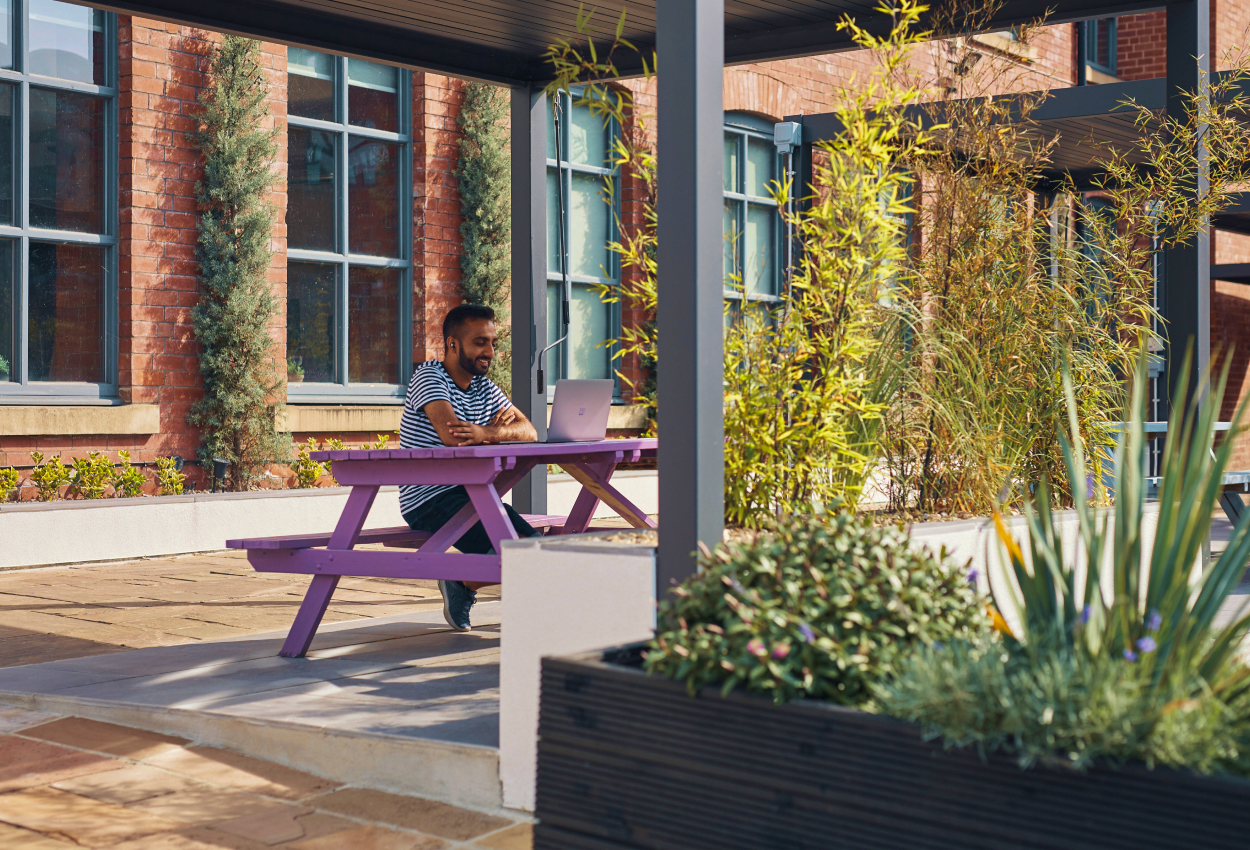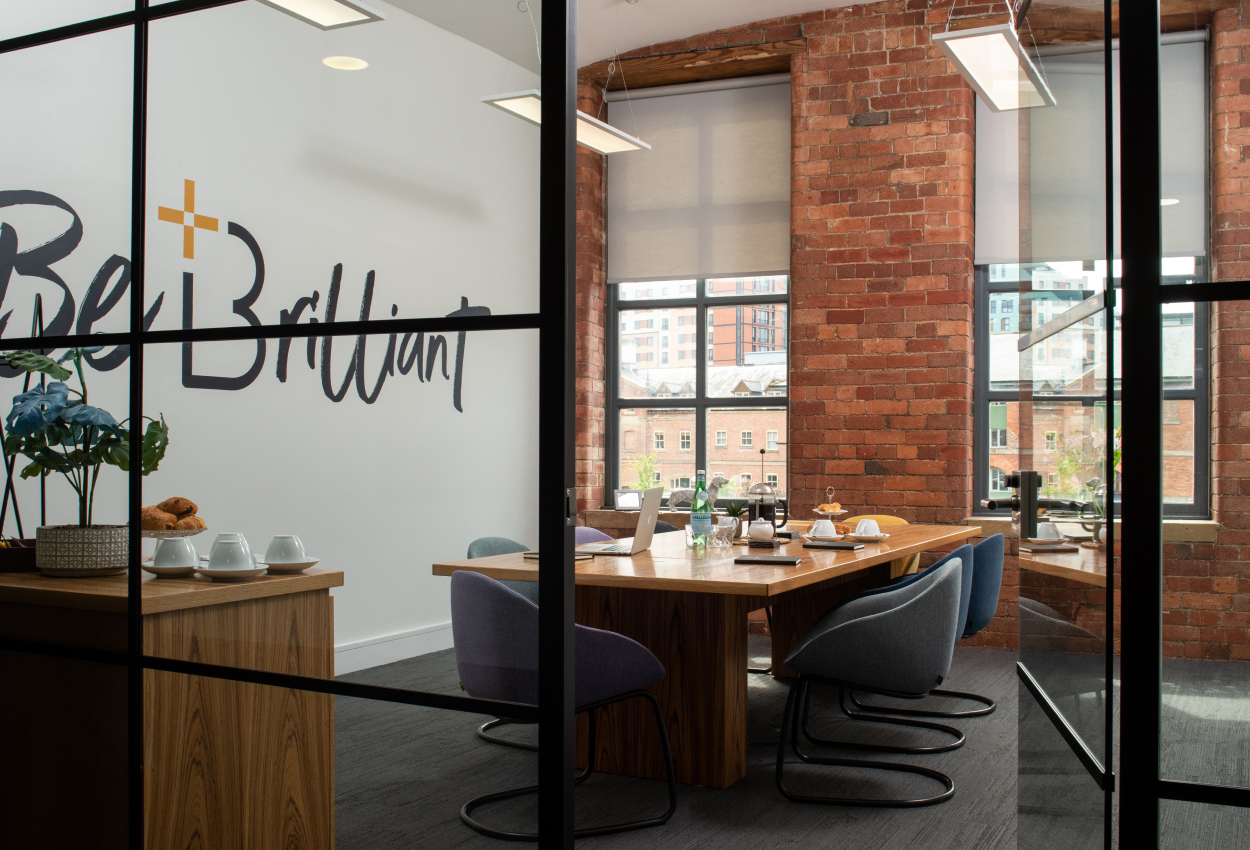A workplace revolution that has transformed the way we think about our work behaviour. Since the Covid-19 pandemic restricted an organisation’s ability to allow people into the workplace, this modern and flexible approach of hybrid working has fast become the norm. But why? Here’s our useful guide to usher you into the new hybrid work culture.
So, what is hybrid working?
Simply put, hybrid working is a more flexible working model that means employees can split their working hours between the office and working from home. Hybrid work varies in flexibility and allows employees more autonomy when deciding their work schedules, resulting in a more positive work-life balance.
Statistics show that hybrid working is here to stay. According to the Office for National Statistics (ONS) before the pandemic only around 5% of the UK National workforce worked mainly from home. This has now significantly increased, with results showing the proportion of workers hybrid working rising from 13% in early February 2022 to 24% in May 2022. Alongside this, the percentage of workers working exclusively from home fell from 22% to 14% in the same period. This positively reflects the shift in attitude towards the modern hybrid work culture.

How can hybrid work benefit businesses?
Whilst the benefits of hybrid working to the individuals may be obvious, the benefits to businesses have been largely unclear. Sources suggest that moving into this advanced way of working offers a significant competitive advantage to those organisations that can accommodate it. Below are just some of the key business benefits of hybrid working…
Improved productivity
Research by the CIPD showed 41% of organisations reported an increase in the uptake of hybrid working which correlated directly to an increase to their organisation’s productivity and efficiency. Unsurprisingly then, they also found a positive trend in employee productivity, with more than two-fifths (43%) thinking that their team were generally more productive when working in a hybrid way. This directly links with businesses benefiting competitively from the improved mental well -being hybrid working offers their employees, as workers who were well balanced and happy were found to be more productive.
Better retention rates and a bigger talent pool
Many traditional working models that are centred around a typical 9-5 office day are now being seen by prospective employees as a detractor. Hybrid work is being shown to help improve retention rates and also open up roles to suitable employees based further afield, resulting in a wider talent pool. The added flexibility hybrid work presents is becoming a non-negotiable for many as a recent study by Microsoft revealed 51% of people would be willing to quit their job if hybrid working was removed or not offered as an option.
Changing offices for the better
Hybrid working can mean a change in office space required. Rather than one large, fixed office, hybrid working allows businesses to be more flexible and locate more, smaller office spaces across multiple locations. This better accommodates a hybrid workforce and helps businesses to embrace and attract a wider talent pool. Office providers (like us) are realising the potential for business growth and investing in better technology to support hybrid working within their office spaces whilst also supporting their clients by reconfiguring their current offices, installing more meeting rooms to meet hybrid working needs and moving to a hot desking layout.

What do you need to successfully do hybrid working?
Most organisations will need to build infrastructure to support the flexibility the hybrid working model provides. Survey your employees to find out what they want and to also ensure they have the capability to be able to work from home. Conduct risk assessments to ensure they have an adequate work space and adapt policies to support both the business and the employees. The CIPD has a great hybrid working guide with lots of useful information to help build a successful infrastructure.
Technology can be an enabling power for hybrid work, provided employees have the access to, and skills required, for the technology. Invest in technology such as remote communication tools to accommodate the switch to hybrid working. Video conferencing equipment, meeting and comms software can help replace some face-to-face collaboration. Whether it’s Microsoft Teams or Zoom, the home working innovation through the pandemic saw collaboration tools go mainstream. Analyst Gartner reports that use of collaboration tools soared 44% between 2019 and 2021, with 80% of workers using them. These are a vital part of a successful hybrid working model.
Investing in portable devices such as laptops are crucial. The E-commerce Survey shows that in 2018, less than half of all employees were provided with a portable device for work, except in the information and communication industry where around 60% of employees were provided with a portable device. Also, having a secure and reliable internet provider has been one of the main concerns for employees wishing to adapt to the hybrid working lifestyle. However, the Office of Communications (OFCOM) found superfast broadband coverage reached 95% of residential homes in the UK in September 2019 suggesting this should not be a barrier to adopting the hybrid work culture.
Whilst its important to ensure that employees have the infrastructure at home to fully accommodate hybrid working, its also essential to make sure the office space is also fully equipped to meet the business needs. The same investment in technological tools in the office is a must. Flexibility is once again the key word here, as offices that include collaborative and social spaces have been found to be more productive as employees really feel the benefit from a day spent in the office working alongside their colleagues. Here at Bracken, we have a whole range of flexible workspaces suitable for all your business needs.

Why hybrid working is the future.
Hybrid working provides the key work-life balance employees are after. According to a 2022 study by the ONS, hybrid working encourages a better work life balance as more than three-quarters (78%) of those who worked from home in some capacity said that being able to work from home gave them an improved work life balance. In a report with those that already utilise the hybrid working lifestyle, 69% stated having a better work-life balance being the main benefit. (CIPD) Findings by McKinsey would further support this as, post pandemic, most employees have expressed a wish for a balance between working from the office and working from home. More than 8 in 10 workers who had to work from home during the coronavirus pandemic said they now planned to hybrid work. This substantial demand for hybrid work has resulted in a significant shift by organisations to establish a new way of working and embrace a new hybrid work culture.
How hybrid working benefits society.
Overall, a key factor for many businesses is an improved work/life balance and the subsequent improvement in mental health and employee well being brought about by the hybrid working model. If the individuals within the business are happier and healthier as a consequence, then ultimately the society to which they belong will also be happier and healthier. This will inevitably have a ripple effect that spreads across society as a whole and will eventually impact every aspect of modern life.
There is also a wider implication of hybrid working and the many far-reaching benefits it has on society overall. Hybrid working can have a significantly positive impact on the environment. A recent study by IWG and Arup's produced some astonishing findings regarding the environmental impact of hybrid working. Their research suggests that hybrid working can reduce carbon emissions by up to 70% in the U.K alone.. Fewer people travelling regularly into the office means a reduction in office pollution, as fewer people are using the space, and a reduction in travel pollution, as fewer people are travelling every day. Overall, that means hybrid working delivers a significantly reduced carbon footprint - and that’s just based on data for the UK, if we expand this to a global scale, then hybrid working is a huge benefit to society and to climate change.
Hybrid working is certainly here to stay, and we can see why: increases in productivity, better retention rates, a more competitive business identity and positive impacts on health and wellbeing, the list is endless. With all the extensive benefits hybrid working presents, it’s an exciting opportunity for businesses to revolutionise the workplace. So, if you’re looking to embrace hybrid working and all it has to offer and you need an office base in Leeds, then we are here to help. Explore
our flexible workspaces today and get in touch to talk more about what we can offer your business.